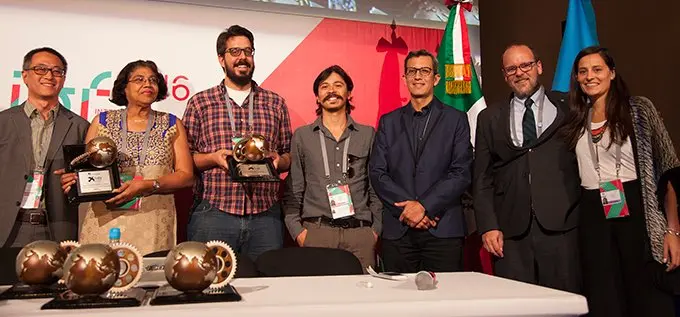FRIDA at the IGF: The South Also Exists
22/12/2016

The FRIDA program and its Seed Alliance partners, ISIF Asia by APNIC and FIRE Africa by AFRINIC, participated in the Internet Governance Forum (IGF), which brought more than 3,000 participants from across the world to Guadalajara (Mexico) on 6-9 December.
During this global Internet governance summit, FRIDA organized two workshops on cybersecurity and entrepreneurship, one of which received comments from Vint Cerf, who was in the audience.
Cybersecurity in and by the Global South. On Tuesday, FRIDA and its Seed Alliance partners organized their first workshop, Cybersecurity in and by the Global South. With a packed auditorium, the session was moderated by Carlos Martinez, LACNIC’s CTO, while panelists included Olaf Kolkman, Chief Internet Technology Officer at ISOC; Cristine Hoepers, General Manager of CERT.br; and Jean Robert Hountomey, Coordinator of AfricaCERT.
To open the debate (https://www.youtube.com/watch?v=_GnqRogVqG4&t=1s), Olaf emphasized the importance of collaborative security as an approach to cybersecurity issues. Collaborative security stems from the very nature of the Internet: the Internet is a network of networks, it is decentralized, and many people contribute to its operation. In this sense, the Internet Society expert noted that “security can also be achieved in collaboration” and that all actions for addressing cybersecurity require the contribution of the various stakeholders involved.
Hoepers shared Brazil’s experiences in connection with cybersecurity. She noted that the most important challenges affecting the implementation of best practices is building knowledge and capacity. “When someone doesn’t know what to do, the problem is shared and becomes collaborative,” said Hoepers. She highlighted the collaboration with LACNIC at regional level and added that “one of the challenges is helping people realize that cybersecurity is a collaborative effort, that everyone is responsible for cybersecurity.”
Meanwhile, Jean Robert shared AfricaCERT’s experience and how they managed to overcome collaboration and trust issues. “Initially, different stakeholders spoke different languages, so we had to reframe the debate in terms of economic benefits, incentives and losses,” said Robert, who added they had found a common ground that facilitated the dialogue and collaboration needed for the technical community and political leaders to work together to improve security in the African continent.
During the workshop, the project leaders of this year’s two FRIDA grant recipients presented their cybersecurity initiatives: Marcelo Palma of Universidade Estadual de Campinas (Brazil) and Erika Vega of RENATA (Colombia). Palma spoke of the initiative to protect TOR against malicious traffic in Brazil, while Vega described the BGP Security project by RENATA (Colombia’s National Advanced Technology Academic Network).
Olaf congratulated RENATA for their project and stressed that “this is exactly the type of action what will lead to a safer Internet, working at IXP level and improving infrastructure as a whole.”
How to become an entrepreneur, survive, and succeed The second workshop presented at the IGF by FRIDA, SIF Asia and FIRE Africa focused on entrepreneurship and innovation in the countries of the Southern hemisphere. Kevon Swift, Head of External Relations for the Caribbean at LACNIC, moderated the workshop and the panel included Joyce Dogniez, Senior Director of Global Engagement at the Internet Society; Carolina Caeiro, Development Project Coordinator for FRIDA; Paul Kukubo, member of Kenya’s Communications Council and serial entrepreneur; Sylvia Cadena, Program Director at the APNIC Foundation; and Sergio Araiza of SocialTic.
This workshop (https://www.youtube.com/watch?v=05G6sYlDTqo&t=1093s) analyzed the challenges faced by innovators and entrepreneurs in developing countries and the difficulties in obtaining access to funds. It also identified the opportunities available for Internet innovation in the countries of the South.
Vint Cerf was among the audience, as were the two winners of the FRIDA Award, Margaret Bernard of AgriNett and Eduard Martín-Borregón of Mexicoleaks, along with the rest of the 2016 Seed Alliance winners from Africa and Asia.
Joyce Doignez highlighted how “entrepreneurship is growing exponentially in the Global South.” Citing examples in India and Kenya, she noted how “an open Internet can help break own the barriers to entrepreneurship and innovation” in the countries of the South.
Carolina Caeiro observed that innovation in the Global South, particularly in social enterprises, is strongly geared towards solving needs and responding to specific problems. As an example, she mentioned the two FRIDA Award recipients. She also spoke of the challenges posed by the need to obtain funding, Internet access and the digital divide, as well as capacity building for entrepreneurs.
Paul Kukubo emphasized the role entrepreneurs play in Africa, particularly in supporting and creating value around public services, where the State fails to meet people’s needs. He spoke of the importance of promoting trust among innovators to encourage them to succeed and observed that “entry barriers to the world of entrepreneurship are not high, but the barriers to grow and gain scale are.” In his opinion, this is the main challenge.
Sylvia Cadena shared that the main challenge faced by entrepreneurship is having to work based on assumptions. Instead, she said that “entrepreneurs should focus on analyzing and reflecting” and cited concrete examples in the Pacific Islands.
Sergio Araiza closed the panel, providing three examples of entrepreneurship in Latin America and the Caribbean: VotoJoven, Ojo Público and CodeandoMexico.
Vint Cerf then spoke from the floor, observing that, when talking about the impact of entrepreneurship on the Global South, emphasis should not only be placed on how many start-ups are created, but also on how many of them survive and succeed.
FRIDA Award Winners. Also within the framework of the Internet Governance Forum, LACNIC presented the FRIDA Awards to the two projects selected as winners of the 2016 edition of the program: AgriNeTT by the University of West Indies (Trinidad and Tobago) and Mexicoleaks (Mexico). (https://www.youtube.com/watch?v=loOEM13zXAs)
(Free access, no subscription required)